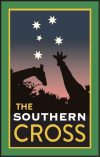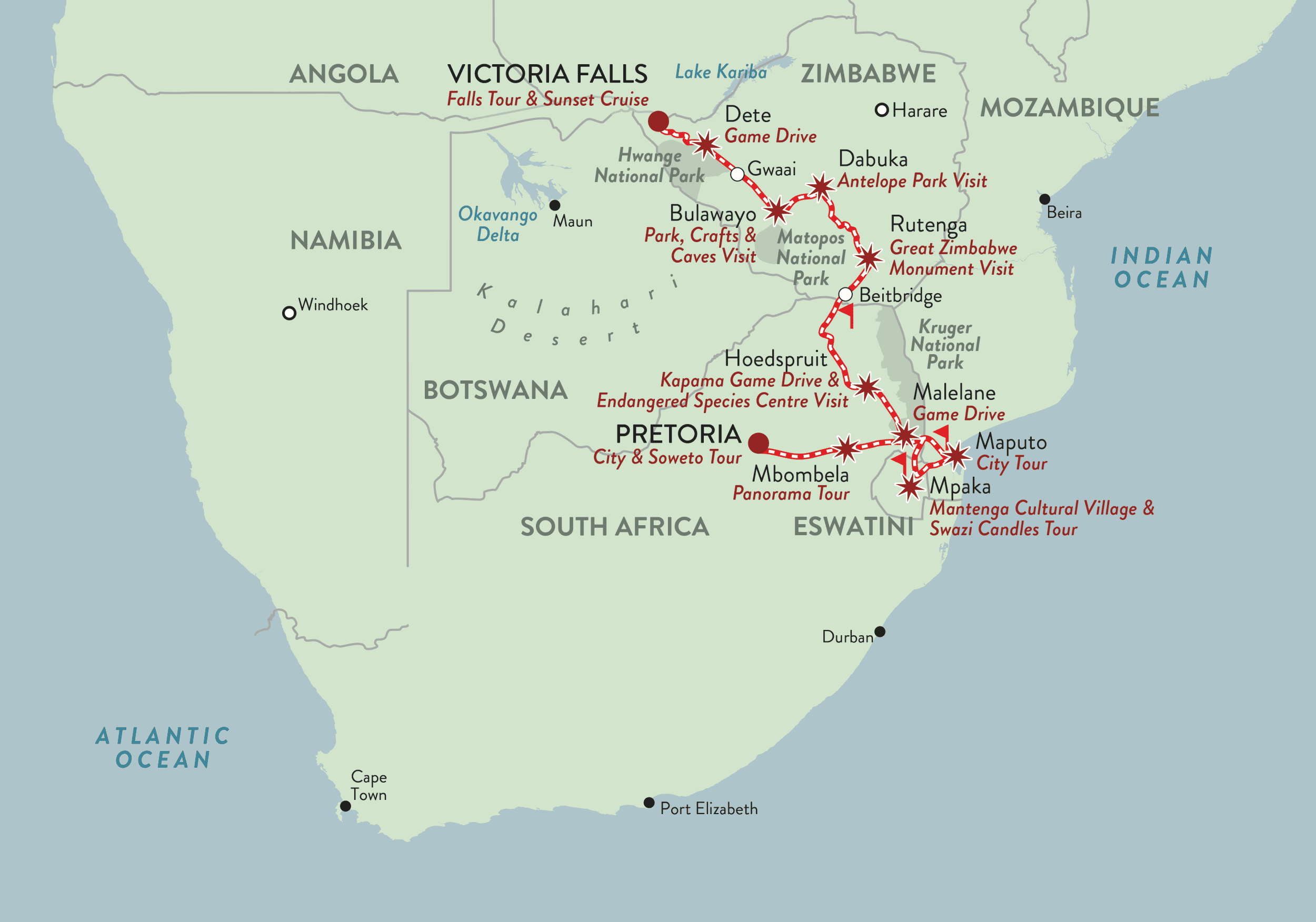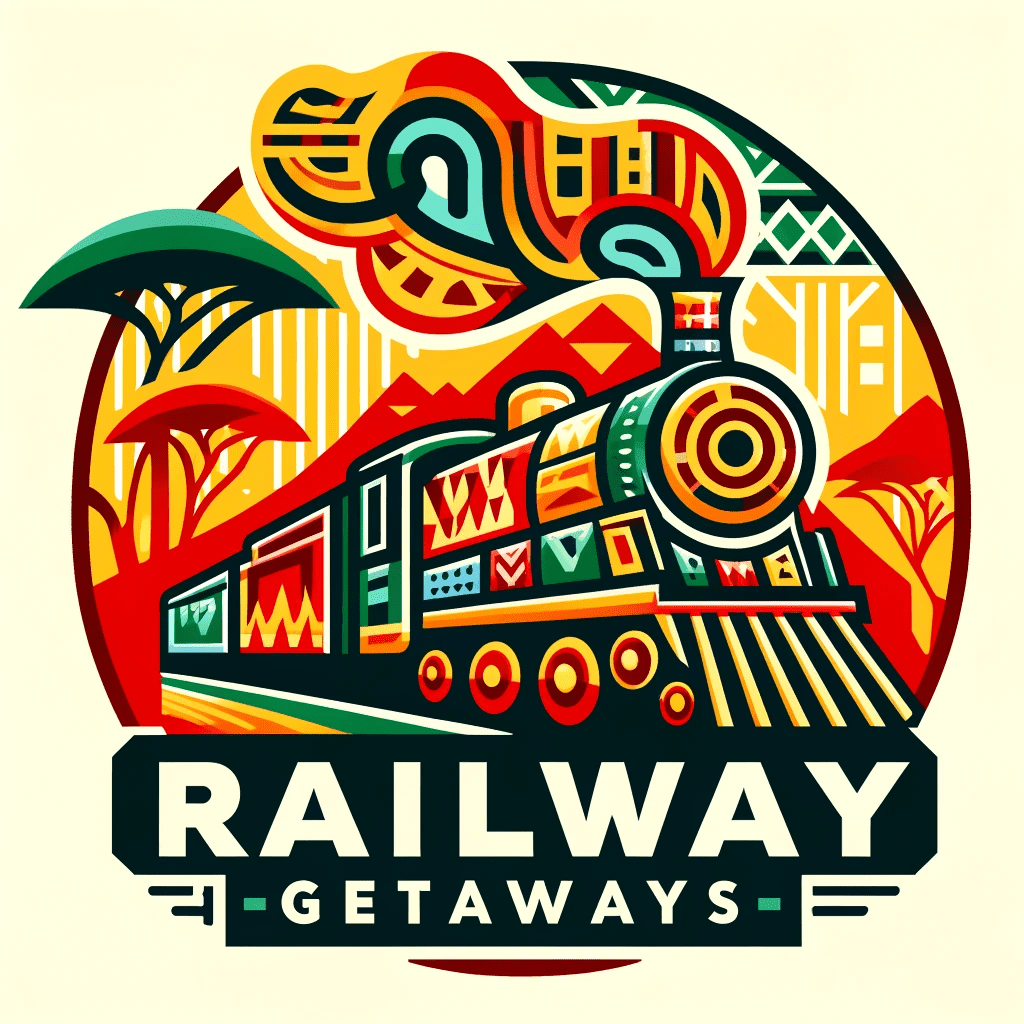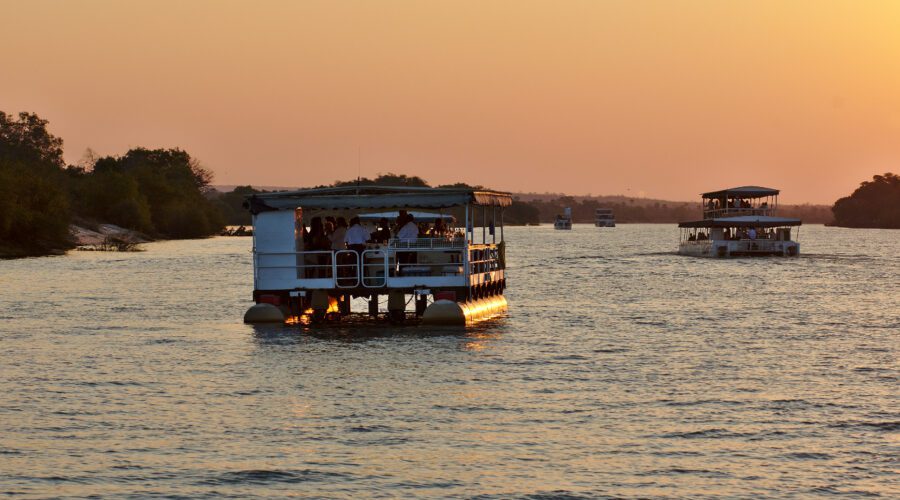An 11-night panoramic journey through South Africa, eSwatini, Mozambique and Zimbabwe

11 NIGHTS • 2500km
Travel across the Drakensberg Mountains to join the Panorama Route with game viewing in Kruger. Tour Maputo, capital of Mozambique, before exploring the mountainous Kingdom of eSwatini. Enjoy a game drive at Kapama and a visit to an endangered species centre and the Great Zimbabwe Monument. Tour Antelope Park and Matobo National Par, a World Heritage Site. Continue to Hwange for game viewing before arriving in Victoria Falls for a walking tour of the village and the thunderous falls. End with a sunset cruise on the mighty Zambezi.

Please check-in a minimum of one hour before departure. Should you wish to visit our museum or do a site tour at Rovos Rail Station, we suggest arriving two hours prior to departure.
Pilgrim’s Rest is a living museum and declared a National Monument. Gold was discovered in this area in 1873 attracting 1500 prospectors. Today many of the restored miner’s houses serve as shops and restaurants. Bourke’s Luck Potholes are strange deep cylindrical cavities formed by river erosion and floodwater. Blyde River Canyon Nature Reserve has the most spectacular viewpoints overlooking South Africa’s Lowveld, so named because it is much lower than the high escarpment along which the Panorama Route runs.
The famous Kruger Park has 2-million hectares of an unrivalled diversity of life forms. It is a world leader in advanced environmental management techniques and home to an impressive number of species, e.g. 336 species of trees, 49 species of fish, 34 species of amphibians, 114 species of reptiles, 507 species of birds and 147 species of mammals including the Big Five.
Capital of Mozambique, Maputo is a city of contrasts offering an exciting mix of cultures. Its architecture is a blend of African, Portuguese and early Colonial traditions with old Catholic churches side-by-side with mosques, fortresses, Victorian mansions and other buildings from a bygone era.
The tiny Kingdom of eSwatini (Swaziland) covers only 17 000km2, most of which is mountainous. For such a small country, it is surprising that it sustains two capital cities: Mbabane is the administrative capital and Lobamba is the royal and legislative capital. In April 2018, Swaziland changed its name to the Kingdom of eSwatini (meaning “place of the Swazi”) and is an absolute monarchy. It is landlocked and borders South Africa and Mozambique. Continue through the Ezulwini Valley to Swazi Candles where guests are invited to interact with the artisans as they make a variety of candles. Woodcarvings, colourful textiles and superb basketwork are also on display. Mantenga Cultural Village, a living museum of old traditions representing a classical Swazi lifestyle during the 1800s. With the traditional artifacts on display, the village illustrates many facets of the ancient Swazi way of life: social, economic and religious. Mantenga Lodge is nestled in the mountains overlooking ‘Execution Rock’.
Situated in South Africa’s northernmost province of Limpopo, renowned for its prolific and diverse wildlife, Kapama Private Game Reserve is home to over 40 different mammal species including the Big Five, approximately 350 bird species and a myriad smaller species. The Hoedspruit Endangered Species Centre is a unique African wildlife facility focusing on conservation and the sustainability of rare, vulnerable and threatened species. Founded on passion, the centre has adopted a holistic approach to its conservation activities such as the educating of surrounding communities, tourism, breeding, rehabilitation and anti-poaching, to name a few.
Limpopo Province is located in the far north of South Africa and shares borders with three neighbouring countries: Botswana, Zimbabwe and Mozambique. For this reason, the province is also known as the gateway to other African countries and also shares provincial borders with Gauteng, Mpumalanga and Northwest. The Limpopo landscape varies from one area to the other from tropical forests, bush and shrubs to semi desert areas with small trees and bushes and mountains to flat land. Limpopo is divided into five regions, strategically located according to the cultural inhabitants. Capricorn is the central region predominantly occupied by the Bapedi people. Waterberg is the largest region with a majority of Tswana people. Vhembe in the far north is dominated by Vhavenda and Vatsonga. The Mopani region near the Kruger Park is Vatsonga whereas the Sekhukhuni region is dominated by Bapedi and Ndebele. Limpopo is the only province in South Africa with more than two cultural groups staying together in their original habitat in harmony. Other ethnic groups include English and Afrikaans people.
Travel through attractive granite hill country to the Great Zimbabwe Monument, a hugely impressive monument situated on the southeastern edge of the central plateau and the largest precolonial monument south of the Egyptian pyramids. A celebrated achievement of the African people and a place where magical fables such as the story of King Solomon’s Mines find their origins amongst the ruins of an ancient city built by the Rozwi people. Discover how these ancient people lived and mined gold and silver, which were ultimately taken out of Africa by Arabic and Portuguese traders.
Set in over 3000 acres of open savannah grassland, Antelope Park is a unique game reserve and a haven of tranquillity welcoming guests and volunteer eco-tourists alike. It is home to the world-famous African Lion and Environmental Research Trust (ALERT) lion rehabilitation programme, which is a multiphase lion conservation initiative. It is Africa’s first genuine programme working to ethically re-introduce the offspring of captive-bred African lions back into the wild.
Matobo (or Matopos), meaning ‘bald heads’, was the name chosen for the area by the Ndebele King, Mzilikazi. He is buried in the Matobo hills just a short distance from the park. It is an apt description of the dramatic hills and granite rocks of this area. The park is also the site of Cecil John Rhodes’ grave at the summit of Malindidzimu – ‘hill of benevolent spirits’. He referred to this hill as having a view of the world. His grave is carved out of solid granite and surrounded by a natural amphitheatre of boulders. A visit can be made to one of the more accessible bushman caves, of which there are many hidden amongst the hills. Matobo is a UNESCO World Heritage Site.
Situated in the northwest corner of Zimbabwe, Hwange National Park covers 1 462 000 hectares making it the nation’s largest wildlife area. It contains a variety of animals and bird species but is well-known for its prolific lion population.
The little station of Victoria Falls was first reached by railway in June 1904. Old colonial buildings, bougainvillea and palm trees against the backdrop of the Victoria Falls Hotel form a charming oasis of soft sweetness after the rugged dryness of the landscape. The Victoria Falls is one of nature’s great revelations on a par with the Grand Canyon, Mount Everest and an erupting volcano. It is believed that there have existed no less than seven different Victoria Falls over the past two million years. These cascades correspond to the lower gorges of the Zambezi. The present falls is wearing from Devil’s Cataract northwards, eroding the softer material behind the present basalt base of the falls. When eventually all the soft matter has been removed, the Victoria Falls will move back, a fresh gorge will yawn and where the falls are now will become a new site for tourists. Although just over a mile long (1.7km), the falls are broken up by various small islands, including Livingstone Island. At their deepest, the falls are 108m deep at Rainbow Falls.
Please dress accordingly for excursions/game drives: mornings can be cool then warm up considerably; afternoons can be warm
then cool down considerably. Warm clothing, comfortable shoes, hats and sun protection are advised. Rain capes are available.
Excursions may be changed according to schedule achieved. Times are approximate and cannot be guaranteed.
Please check with the Train Manager or reservations@rovos.co.za for any updates or changes to the itinerary.
In your suite you will find the Journeys magazine that features articles of interest related to the route.
INCLUDED: Accommodation; all meals; all beverages; room service; limited laundry; excursions with a qualified guide (where applicable); entrance fees as per itinerary; government tax. EXCLUDED: International sparkling wine; gratuities; personal expenses; visas; travel insurance; pre- and post-tour transfers, accommodation and flights.
MEALS ON BOARD (unless adjusted) Breakfast 07:00-10:00 • Lunch 13:00 • Tea 16:30 • Dinner 19:30
+27 41 581 6260
book@eastcapetours.com

